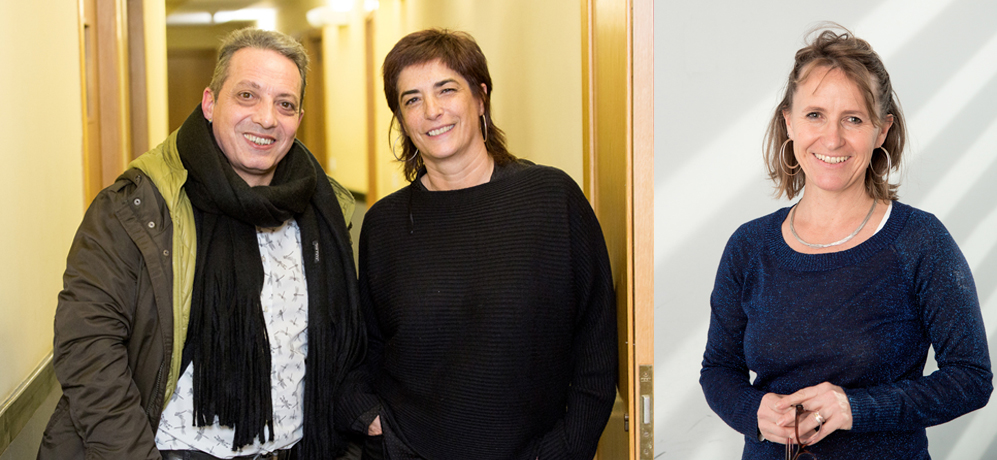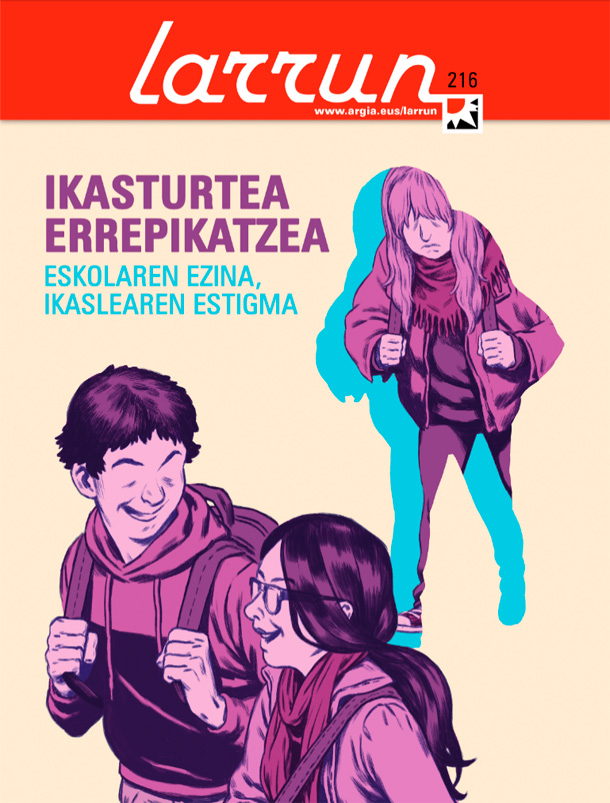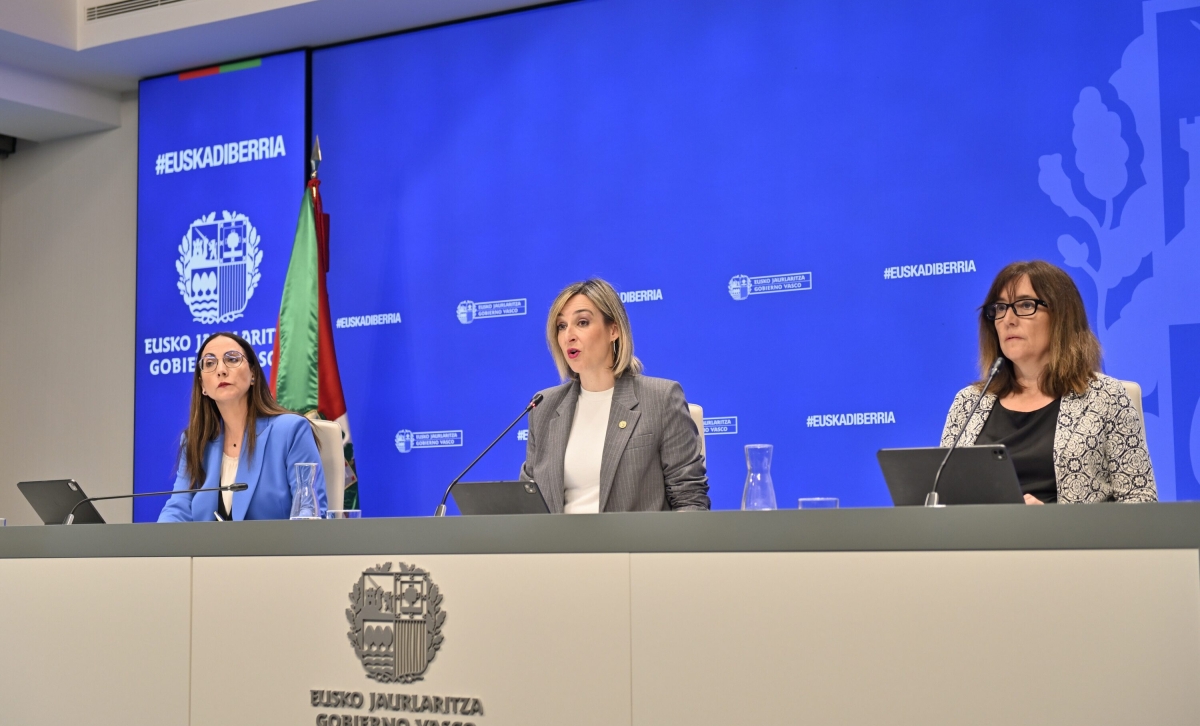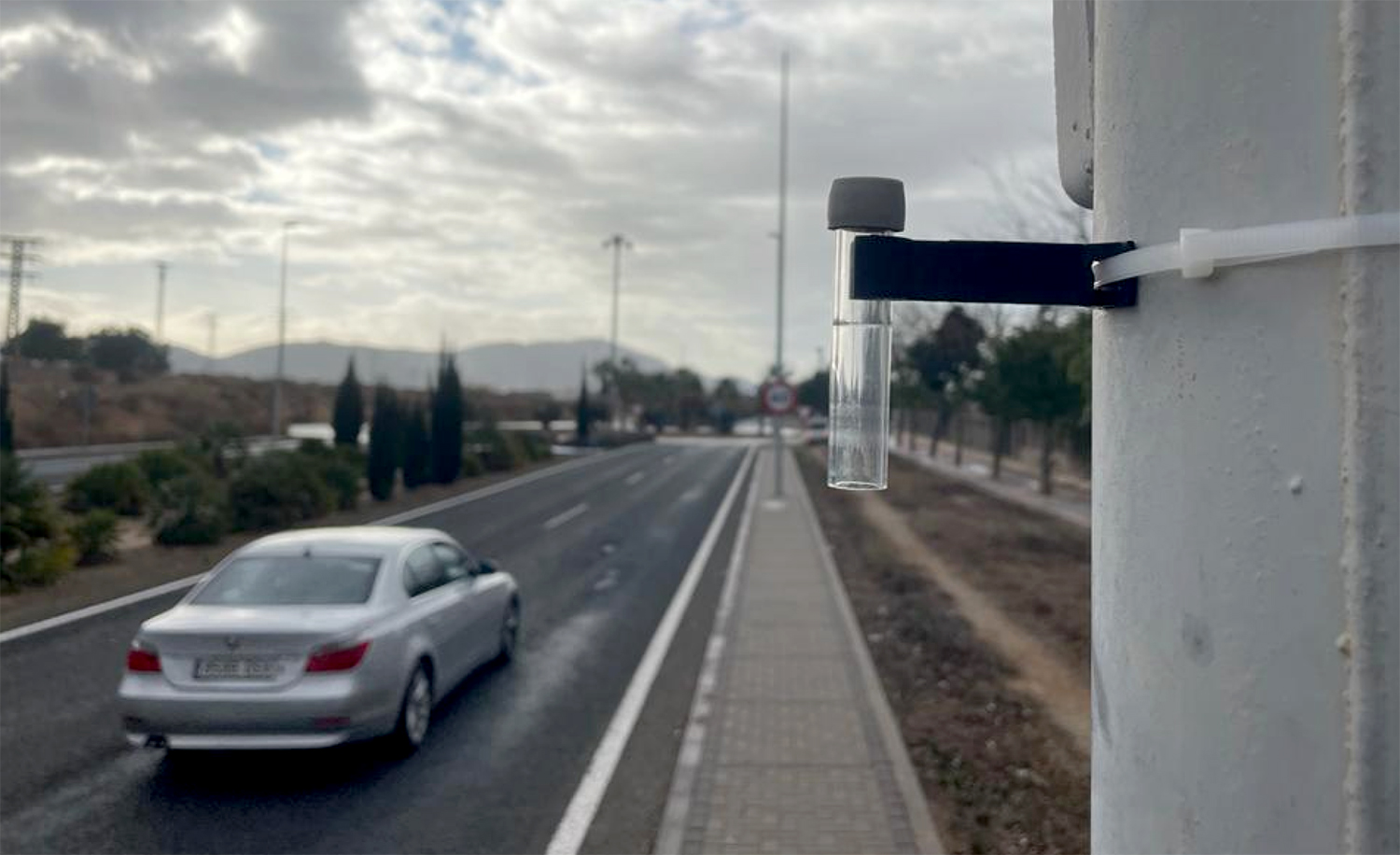Iceberg peak
- The last exceptional option that remains after testing everything or the measure that is used too often? The salvation of disabled students or the reflection of the deficiencies of the current school model? We have brought together Myriam Iralde, SEASKA trainer, Pedro J. Male, Inspector of Education and Agurtzane Martínez, professor at the University of Mondragon. They have talked about an educational system that overlooks academic performance, the need to change the evaluation paradigm, the stigma of repetition and the weight of expectations, the need for flexible academic itineraries that respect the situation and rhythms of each student, the contradiction of legislation… And we have realized that it is the iceberg summit, that behind the approach of “challenge or not” is more complex and deeper reflection and reflection.

What does it say about repeating laws in compulsory education? At what level and in what cases does it make repetition possible or obligate it?
Pedro J. Male: In the Spanish state, it can be repeated once in Primary (EP) and twice at most in Secondary (ESO), but there are many exceptions, especially in the case of students with special educational needs. In some cases, for example, it may be a year later from Child to Primary, or twice repeat the 4th ESO course if the team of teachers sees the possibility of taking the title. The law obliges to repeat if the student has not passed four subjects; if there are three outstanding subjects, the decision is in the hands of the teaching team, but recently LOMCE and Heziberri have established that if two of them are Language and Mathematics, the student must repeat directly. The approval of the first parents was essential, but today the decision only falls to the teachers.
Myriam Iralde: Before 2015, in the French state it was possible to repeat once in Primary and once in Secondary, the parental authorization was not necessary and was a decision of the classroom council. Since the 2015 Decree, repetition should be an exceptional measure, it can serve to overcome the breakdown of lessons (i.e., if a student has not come to school for illness or for any other reason) and it is necessary the authorization of parents, only the class council is asked. For example, if the student has not obtained the desired orientation [there is general, technological and professional orientation], he or she may ask that parents be repeated.
And the reality is: Is it an exception or a generalised measure to have it repeated?
M. Iralde: In SEASKA there is very little repeat: last year three second-class students from the 943 have repeated and two have failed the Baxoa test, so five have been the students.
PJ. Male: If we look at the data, it's much more common to repeat in ESO than in FP. In Primary School, it may happen that, due to a special educational need, because he is a late immigrant or for any other reason, in the first two years he does not get the minimum of reading and writing advises repetition. But there are few cases, compared to ESO. 2nd ESO is the most problematic and the most repeated level. Methodological change from VET to ESO, greater demand, new organization of subjects… There are those who pass the first course of ESO in one way or another and fail the second. Despite this, the rate of repetition in Hego Euskal Herria is lower than in the autonomous communities of the Spanish State. In the CAV, for example, in the FP, there are 2-5% repetitors and 2. 14% in ESO. Small amount. But in total, 4. 30% of the students who come to the ESO repeat at least once in their educational itinerary [according to the latest data, the ESO repeats are 24% in the CAV and 23% in Navarra].
And is the 30% repetition an exceptional measure?
PJ. Male: No, I wouldn't say it's an exception. It is not an exceptional measure, although, as I said, the number of repeaters is lower compared to other places.
.jpg)
What profile does it affect?
M. Iralde: In France there are more boys than girls, both in achievement rates and in schools and colleges, and students who have been few mothers at ikastola are more likely to repeat them, among other things. In Seaska we cannot draw any special profile.
PJ. Male: Yes, there are more repetitive boys than girls. And the variable that I would have to analyze: an important percentage of those that repeat are families with a low socioeconomic and cultural index.
A. Martínez: To this we can add students who lack motivation, those who struggle hard, those who have personal or family problems...
Repetition is beneficial for most heads of studies, according to a study published by the ISEI-IVEI in 2009. In your environment, what is the general opinion that exists among the teaching staff?
A. Martínez: The reading we do in schools and in college is different. If you ask me around me, we do not agree to repeat and we think that we need to reflect deeply on education. In addition, the same studies indicate that repetition does not benefit students in the results, in their subsequent educational trajectory. But it is true that in our society we need a fairly long process of changing culture and that the measure we have used is repetition. The law itself says that before adopting this measure, the rest of the measures must be exhausted, which means that another type of support must be given to the student, perhaps with two professors in the group, offering more resources, adapting the curriculum and the methodology… The system is very focused on academic performance and that is the variable that decides whether or not we pass the course. Sometimes they are not tender decisions and debates, but in general I would say that it is not a difficult decision for teachers, if they see that the student’s level of performance does not reach what is required, that it does not master the content requested.
PJ. Male: I would say that most elementary school teachers do not find too much sense of repetition and consider it an extreme measure. In FP, the most common thing is to evaluate the student as a whole, and what most subjects give also has to do with being a single tutor, as it has more elements and variables for their assessment. At the end of the course, it is usually a question, per note, due to deficiencies and gaps, do we see this student able to move forward, taking into account their integrity? In ESO, this is lost and each teacher evaluates their subject in isolation. Global assessments are much smaller and the law is also stricter, for example because it states that you have to repeat automatically with four less. The ESO faculty, in my opinion, sees repetition better as a measure when academic performance is not enough.
M. Iralde: In SEASKA, with the 2015 decree nothing has changed, because we rarely proposed repetition. The decision is made in the Classroom Council, but first each teacher has to answer the following question: Will the next course be able to follow the program? This is a very difficult question, as two students can have the same grade and a different answer. In these cases, the deletion of the note is an aid, as the profile of the student will be more precise to make a decision. If most teachers think it will be good to repeat, we discuss to see if it will actually be fruitful for the student, taking into account their whole situation. And finally, you need parental permission. Our criteria are the student’s academic level, his/her commitment in the classroom and in housework and his/her general situation (emotional, family…). In the last year of the school, for example, it can be fruitful to repeat, especially when the student has committed himself to his orientation path. Undoubtedly, the situation of each student must be worked with the family, respecting their desires to the maximum, the orientation (general, technological or professional) being chosen and not supported.
Apparently, the main criterion for making it happen again is academic achievement.
A. Martínez: Normally, the evaluation always focuses on the student’s weaknesses, and also without taking into account the context or what he is living at home, with friends... We ask the student to overcome a few minimums, but we do not wonder what characteristics the context that we offer him/her has and if it is the context that corresponds to him/her. Putting all the burden on the child is not fair.
PJ. Male: Evaluation is a very complex issue that the law simplifies: to set minimum levels of contents and achievements and to classify these minimum levels by age. If the main criterion and the only one at some stages is academic performance, this makes the decision to repeat very simple: Does it come or not? Because evaluation is based on supposedly objective results, according to the minimum established in the official curriculum. In any case, the indicators of contents and achievements of the curriculum are the same for all students, but are the indicators of contents and achievements really the same in all centers? Do the same criteria apply? I have doubts, because there are centers with a higher level of demand, and where the school does just the opposite, because expectations are different by the typology of students and families. And expectations affect students, parents and teachers, sometimes consciously and sometimes unconsciously. In short, the teacher, when assessing, takes into account the average level of the group he/she faces and is his/her reference for the evaluation of each student.
M. Iralde: In terms of expectations, fathers and mothers who, according to a survey, do not have a diploma have much less ambitions than fathers and mothers who are qualified for their children, on the same note. Thus, for a student with an intermediate average, 59% of unqualified employed parents demand professional guidance and, if the child is an entrepreneur, responsible or teacher, they request a general orientation in a proportion of 91%.

It is repeated depending on academic performance, but what should be the evaluation criteria?
A. Martínez: We have the kind of assessment required by the educational system of the last century, based on instruction, according to the needs we had in industrialization and in society. At the moment we are not there, there are other challenges and we need another educational paradigm: if we were to take that step, it would not be necessary to repeat because students should not be at the same level based on age, at the same time as creating different contexts for the student.
PJ. Male: Who says they have to get the ESO title at the age of 16? Why not give the opportunity to those who are more mature and go faster than when they are 14 and those who need more time to leave when they are 18? Why not propose a flexible academic journey and adapt the speed and learning process to the situation and needs of each student?
Is it possible to eliminate repetitions as organized education currently stands?
A. Martínez: Indeed, we talk about repetition because we have one educational system and not another, and we have the school and the curriculum organized in one way and not another: classrooms and levels of children of the same age. Who says that all children of the same age learn at the same time and at the same speed? That's not the case, not even among adults. It's a fiction.
It's harder to repeat it at worst, so I hear it.
PJ. Male: Studies say that repeating does not have positive academic effects. Once again, the key lies in expectations: if I have a repeater in class, the expectations that the student will have since the first day will be much lower, both from the faculty and from the parents, for the simple fact of repeating them. In the study of the ISEI-IVEI it is stated that it is academically effective in 30-40% of the students who repeat, that is, for 60-70% it does not serve anything, only for bad, because it must be taken into account that repetition has social, emotional and psychological consequences besides academic ones. It is normal that it does not improve academically, if it is repeated and the solution does the same again, learning in the same way: if nothing changes and disabilities are the same, the result will be the same.
That said, perhaps repetition can be useful in some exceptions: if it takes longer to acquire the ability to read and write, for example, or if you notice a lack of maturity and needs one more year to reach the maturity level of others, but the level of knowledge and academic performance cannot be criteria of repetition.
A. Martínez: For me, the personal consequences that repetition can have are the most serious, because the school is not only informed, but the school must ensure a healthy and integral development of all students. To do this, you have to take into account what you have in front and what it is, your family and cultural situation… The starting point is to put the right conditions for the student to learn and develop, and if it is not done, it is normal that the student does not do the right process, if he has other concerns and disabilities, on a personal level, around… To repeat, today is a symptom that does not work and we should go to see what does not work.
PJ. Male: We should take into account all the consequences behind each measure and if some of those consequences are bad, if you see that they can create risks, then do not take the measure.
M. Iralde: In France, there are studies that state that repeating in elementary school and at the beginning of the school is not productive, the last year of the school and that later it can be more productive. When we proposed to repeat in the cradle, we referred to students who do not have basic competencies: oral expression, reading and writing… We had a complicated case: the student wanted to make a general orientation and we did not accept it in the council, we proposed to repeat it. Finally, the family rejected our proposal and the student went to another center to follow the professional path. Although I did not have the level of guidance I wanted, I think it was a mistake on our part. Since then, we have focused more on the student's will.

Pedro, you said that if the student/teacher repeats and redoes the same, the result will be the same. So if you repeat it, how do you do it?
PJ. Male: Precisely, the law itself insists on the need for an individualized and specific reinforcement plan for the student, applying a different methodology, in order to avoid what failed last year. It is a contradiction: if a specific plan is made to the student, why repeat it? Develop this plan and move forward, adapting it to the needs of the moment. Is that done? On paper yes, but on a daily basis within the class, is the teacher able to offer everyone what they really need in the classroom of 25-29 students with multiple and varied starting points? In addition, they have to give an oversized curriculum and each student has different ways and strategies to learn. And that teachers don't always have the resources that they would need.
A. Martínez: This being so, I think that within the class you can make changes in the structure that we have. The starting point is to think about what the school is and if we want to base our curriculum on competencies, we have to create other contexts, among which is the diversity of the students. It is true that we have to manage this diversity and that professionals need training for it, but I believe that it can be done, that this is our challenge and that this would avoid having to repeat it. In fact, to repeat is not serious, if we raise it in another way: we need different experiences in our lives to learn things and to develop ourselves as people, and in the first we do not succeed, in the second or in the third we will, so we overcome difficulties and develop learning, it is also to repeat, to have more experience to obtain learning, but the question is that in our educational system and in our society it is a student that repeats.
PJ. Male: Yes, without a negative tone, it would have been another measure to adapt to the student who needs more time, but as Agurtzane says, it is very stigmatized and has a very bad reputation; the student is marked from the beginning, influencing the expectations he mentioned earlier. For example, what I have had to do in front of the delegation’s table, when parents are told that the child has to repeat, terrible! They live very badly, because no one wants for their child something that is so badly seen in society. I also make another reading: Would those parents who question the decision of the teaching team question the decision of a doctor about their child equally harshly? And that is that, after all, they are both entirely professional decisions.
A. Martínez: The reaction of parents is understandable, because we have a very competitive society, we put labels on everyone immediately, and what they want is that they do not put too much emphasis on their children and do not put their image at stake in front of others. What can be done to prevent this from happening? Elsewhere, teachers and parents make these kinds of decisions together, because from the very beginning there is work with families. Personalised plans are drawn up in Finland at the beginning of the course, bringing together pupils, teachers and families.
How to act with a student who does not want to learn?
M. Iralde: Students who do not want to study can have many reasons, if reason is “only” in relation to work, few students learn from pleasure, because learning requires strength. Some students have internal and other external constraints (teachers, parents, friends…). Appropriate guidance and responsibility must be offered to you: your behaviour will influence your orientation and you must be aware of it. And if reason is linked to the emotional situation, it is necessary to work with the family, with the teachers, by necessity with the help of a psychologist... I do not know any student who wants to be in bankruptcy and therefore, we have to go to find the reasons and, above all, to seek solutions.
A. Martínez: Learning in school is sometimes very boring, what we need to build our knowledge is often not what the school offers, it's not attractive. We get students to learn because they have to get through the course, not because of interest.
PJ. Male: All right, but carefully, the appeal, the motivation, etc. They're subjective concepts. In our time, watching a video in class was the most attractive thing in the world…
A. Martínez: When I attract him, I don't mean that we have to be doing fun and special things at all times, but we need challenges for anyone to advance in knowledge, we have to awaken that need to learn something else, and in classrooms I'm creating that need. The interests of each student are different, it is not easy to respond to the interests of all, but we should organize different things and challenges so that the students want to know autonomously. Curiosity is fundamental.
PJ. Male: Yes, but a few students will have to learn something they don't want to learn. We can't leave a student without writing or reading, or without multiplying, even if we don't want to. And there will always be someone who doesn't want to.
A. Martínez: Our job is also to know why you don’t want it, and it can be key in the family, among friends… and if we don’t have an intervention, forget about the room. How will you want to learn from children who have separated from their parents? It has other concerns in its head and we have to assume that it will not follow a certain time in a certain area, which is not the most appropriate time for it. And that's what we have to do, depending on each case. That is why I say that we have to change the evaluation paradigm, rather than focus on performance, taking into account the context, because evaluation is the tool that we have professionals to help in student development.
And they will learn to write, to read, to multiply, because they will feel their need in life. The product, as the school “sells” it, may not want to learn, but it is raised in a different way and as a challenge.
.jpg)
a time he or she will not advance in a given area, which is not the
most appropriate time for it,” says Martínez.
You have pointed out that the socio-economic and cultural situation of each of them influences, that also the problems the student may have in the family, in the circle of friendships, the psychologist... Is the faculty being asked to collaborate with other professionals?
A. Martínez: Indeed, it cannot be just the responsibility of the teacher, a teacher cannot be responsible for the entire group of students. There are support services, there are other services in the community and if there is no coordinated work, in some cases it is impossible for the student to advance. The system should organise the tools at its disposal to provide adequate responses.
PJ. Male: To be a child you only need a woman, an entire lineage to raise a child.
It is mainly repeated in the ESO and in the last years of school. On the contrary, there are those who say that the sooner it is repeated at age, the better, so that a child without sitting the base does not take those deficits in the following years.
PJ. Male: Corroborating the above, I believe that repetition should not exist, it should be an exception to the application in extreme cases, and if it were extreme cases, it would have to be analyzed one by one and it would have to be decided according to all the characteristics and variables of the case. For example, if a child has spent more than half a year in the hospital due to an accident or illness, that student has not had the opportunity to take the corresponding course by age. For it repeats, and nothing happens, neither the teachers, nor the parents, nor anyone should see it as a stigma or a drama. And in the same way, a 6-7-year-old who has not learned to write or read may find it good to continue working for another year, because it will be an essential tool for the next levels and also for life.
Another way to ask the question: Can the repetition in ESO be due to the fact that adequate measures have not been taken previously?
PJ. Male: I find it dangerous to do this rectilinear equation.
A. Martínez: We have already said that in Primary the curriculum is more global and that makes it easier for students to be well, feel accepted, be part of a group, safer… In ESO we have a fragmented curriculum based on content, a lot of isolated subjects…
PJ. Male: At the CAPV we have a fruitful law in the last two courses of the ESO, unique in the State: curricular diversification [program aimed at students with academic difficulties]. Some students are made impossible to internalize non-interrelated subjects in this way, and what makes the curricular diversification is, in a way, to return to the globality of Primary Education; ESO content is provided, but not in a single way, but jointly and integrated into two blocks, and the results are very good.
A. Martínez: Another characteristic of curricular diversification is that it uses a very practical methodology. That's what I was talking about when I was talking about an attractive education, something like what we should do with all the students.
What can you do before you make it happen again?
PJ. Male: I spoke earlier about the contradiction of the legislation, the two measures it contains: the repetition and the individualised reinforcement plan. With this second, it would have to be enough: if that plan is well-designed, appropriate to that particular student, it should be enough to help the student progress, without repeating.
A. Martínez: I would change the paradigm. I do not believe that we have to focus the plans exclusively on the student, because that is how we will change nothing.
PJ. Male: Everything is tied, the one brings the other. If we want to change the methodology, it is necessary to change the evaluation systems, criteria and indicators, and to do so it is essential to modify the basic curriculum. I would start emptying the current resume, without adding things (because they are being added and added in recent years), so that we choose well what are really the essential things that anyone has to master and know in tomorrow’s society.
A. Martínez: Not content, because we must base our education on well-defined competences. And that would help the repetition not exist, but there wouldn't be that the repetition would automatically pass to the next course: the students would be for projects, the students would do their own process and we would be collaborators in that process. We need to break the rigidity of the school, we need open classrooms instead of closed classrooms, groups that mix different ages and students, more than one teacher in collaboration… We need to change the organization of the centers if we want the students to respond.
M. Iralde: To propose support and personalized works to the student, organizing group work in a generalized protocol, establishing links between themes (different works can be proposed at the same time). We have to understand that we are a trio: family, students and teaching staff; we have to achieve a relationship of trust. And we have to listen to the young man, we have to get the commitment of the student in communication. It is certain that progress is being made while working; it must be treated with good eyes valuing all of its achievements and carrying out its skills.
From our experience, the most difficult thing is to manage the growing extension of students in the same classroom. How do we deal with it? Avoiding giant schools; centres of 250 pupils and classrooms of more than 25 pupils. Students who feel weak in class must be given the opportunity to advance: establishing different levels of achievement, proposing sporadic works, helping each other, encouraging teamwork to take advantage of the heterogeneity of students… In order to carry out an organization conceived by the professor himself, students must listen in the classroom and to be heard, the teacher must know how to listen to his students. And we've mentioned expectations: teachers always have to believe in our students, they often don't believe in themselves and sometimes parents, so we have to believe in them, because from one year to another some students manage to mature intellectually and emotionally and get out of the situation of error.
In many cases, among students with difficulties there are some who move or are causing and it is difficult to manage. The first condition to deal with this topic is to have the group of students in hand, to achieve a minimum discipline, the commitment of the students. Once this is achieved, it is easier to approach these students, holding their hand over and over again and again. It is not about equality, it is about equity: these students need more attention, although at first we often reject our help, we should not despair. We teachers often complain that the student does not work at home, but we do not realize that in the same class children do not get the student to work and that is our responsibility, we have to achieve it with patience and good eyes for him to work, without falling into demagogy. This requires a lot of energy and we have to be fit, and at the same time the adolescent has to be a real balanced adult. In the end, teachers and teachers have to have a good knowledge of adolescence in order to have the means of communication with them.
How do they behave in other countries?
PJ. Male: Repetition is the legacy of Jacobin education: it is systematically repeated in Spain, France and Portugal based on academic achievement. In Europe, this is an exceptional measure affecting countries such as Belgium, Germany, Italy, Luxembourg, Malta, the Netherlands, Austria, Finland and so many other countries. And they automatically move to the next level in Denmark, Greece, Ireland, Cyprus, Sweden, the United Kingdom, Iceland, Liechtenstein and Norway. People in difficulty receive additional assistance.
A. Martínez: I'm not going to look at whether or not I repeat a country as an education model, but why it's a quality education system in a country, what we have to ask of an education system, and because of that, we have to look for referents. We have to be clear about what we want our educational project to be to target one model of society and not another. We cannot say that we want to base our education on competences and then act according to external evaluations.
PJ. Male: The problem is that there are different approaches to defining educational quality and for the Organization for Economic Cooperation and Development (OECD) quality is linked to the profitability of education.
M. Iralde: In Italy, summer classes are organised so that pupils can pass the year on to the end of summer test. In Finland, a personalized follow-up is made to the student and very few repeat it; each teacher has been a format to help students in difficulties and has the collaboration of specialized teachers. Manual activities are as considered as mental work and are offered different ways depending on the achievements of the students; in addition, to achieve what is here Selectivity and Low, they can spend between two and four years, as they go through modules.
.jpg)
VOCALS
Myriam Iralde Junca, SEASKA trainer
Created in Baiona in 1970. Graduate in mathematics, he began teaching at the Seaska Lyceum in 1993. He has been taught in mathematics as a high school teacher. Since 2009, in the medium term, he provides general training of new Secondary School teachers in the SEASKA Federation and participates in the Mathematics training of new Primary School teachers. He is also a professor of mathematics at Piarres Larzabal College.
Pedro José Macho Aguillo, Inspector of Education
Born in Bilbao in 1962. Graduated in Teaching and Bachelor of Philology, she has been a professor of VET, ESO and Vocational Training. He is one of the creators of the Higher Education Training Cycle of Model D of Early Childhood Education and a member of the Steilas Union Education Commission. He has participated in various social movements, especially in the LGTBIQ liberation movement, internationalization, gender equality and antimilitarism. He's been an Education Inspector for ten years.
Agurtzane Martinez Gorrotxategi, Professor of Mondragon Unibertsitatea
Born in Erandio (Bizkaia) in 1966. Bachelor of Philosophy and Education Sciences and Doctor of Philosophy and Education Sciences. He has been a professor of Compulsory Education and is currently a professor at the Faculty of Humanities and Educational Sciences of Mondragon Unibertsitatea in the Master's degree and in the Master's Degree of Innovation. He is the coordinator of the latter. ZEHAR is also the coordinator of the research group and analyzes the teaching and learning processes.

The Department of Education reported on diagnostic evaluations in February: He talked about the mid-stage of 2023 and the end-stage of 2024. Since the disastrous results would show that we have a structural problem, the department decided to comply with the procedure (publish... [+]
I found the old news on the LIGHT ephemeris channel: On April 23, 1918, Irish workers went on a general strike in I. Against forced recruitment for World War II. Thanks to the response of the workers and independence supporters, Britain was forced to retreat.
We don’t have to... [+]























